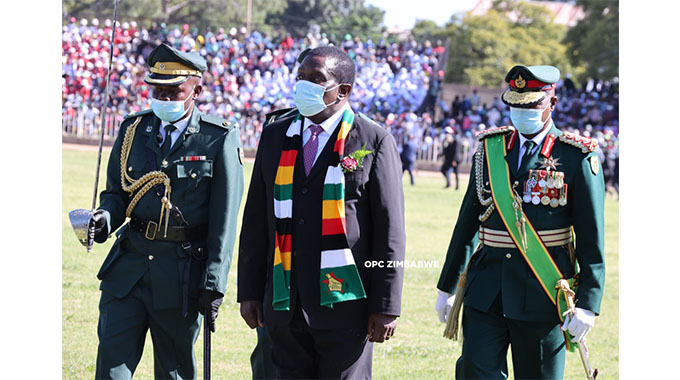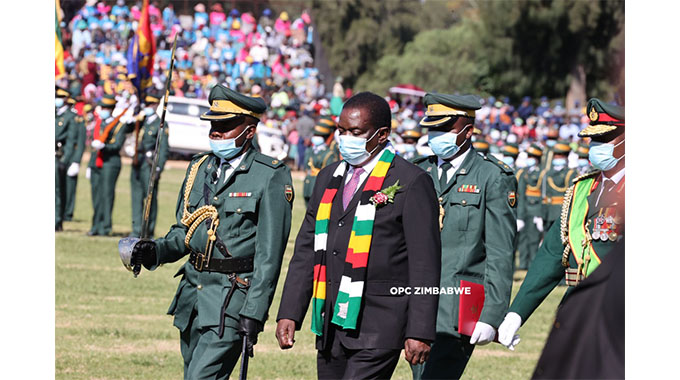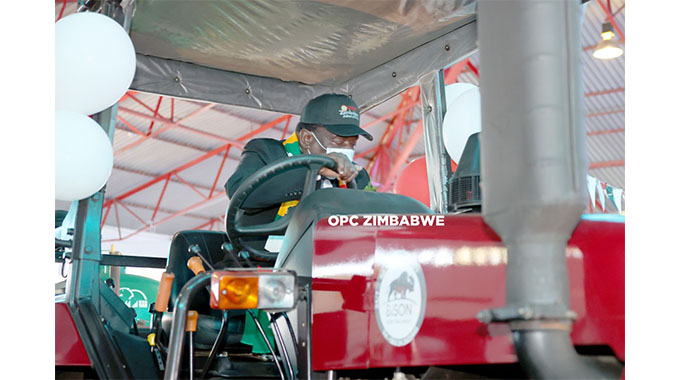The Chronicle

Prosper Ndlovu, Business Editor
ZIMBABWE cannot afford to remain behind and as such local businesses must swiftly embrace innovation and re-engineer every aspect of their operations to expand opportunities while increasing local and international markets, President Mnangagwa said yesterday.
 President Mnangagwa
President MnangagwaHis sentiments come at a time when the country and the rest of the world are grappling with disruptive effects of the Covid-19 pandemic, profound changes taking place in the international economic cooperation and geo-political complications such as the Russia-Ukraine conflict.
Officially opening the 62nd edition of the Zimbabwe International Trade Fair (ZITF) in Bulawayo, President Mnangagwa said these realities demand that local industries closely examine the impact of supply chain disruption and matters related to financial health, risk management, customer engagement and behaviours, among others.
Amid this volatile global economic environment, he said his administration, working closely with the private sector, was striving to reinforce internal economic resilience and expanding domestic gains, taking advantage of identified strengths to create more opportunities.
At the heart of these interventions is the need to embrace innovation riding on the benefits of the Fourth Industrial Revolution, said President Mnangagwa.
“Innovation is no longer a luxury for the future but a necessity. I call upon businesses and the manufacturing sector in particular, to re-engineer every aspect of their processes in line with present and future trends. We cannot afford to remain behind,” he told the large gathering, which witnessed the event.
“The effective use of the internet for e-commerce must see our sectors expand opportunities and increase their footprints in local, regional and international markets.
“Innovation is development and is the future: If you do not innovate, you will be left behind and we don’t want to be left behind. There is no room for rigidity if we are to realise sustainable economic growth.”
In line with this year’s ZITF theme: “Re-think, Re-imagine, Re-invent: Value Chains for Economic Development”, President Mnangagwa said adoption of new business models and practices should yield increased production and productivity, growth and broader economic opportunities across the country.

He commended the ZITF for providing a platform for innovative entrepreneurs including students from the Innovation Hubs and Industrial Parks at the country’s State universities to showcase some of their top innovations and inventions.
“Going forward, my Government will continue to strengthen scientific institutional reform and the science and innovation ecosystem for the modernisation and industrialisation of Zimbabwe,” said President Mnangagwa.

“Similarly, we are broadening talent development to cultivate a science-oriented, professionally competent and cutting-edge human capital base, which feeds into the needs of our new industry and commerce.”
President Mnangagwa said this year’s trade expo received an overwhelming response with 100 percent of exhibition space taken up for the first time in many years resulting in an overspill of participants.
“This must be challenge to the ZITF Company to re-think and re-imagine the trade fairs of the future. The construction of additional exhibition space remains critical,” said President Mnangagwa.
He said the on-going implementation of the National Development Strategy (NDS1:201-2025) was registering notable results as evidenced by the 7,4 percent economic growth in 2021 and the projected additional growth momentum of 5,5 percent this year, which is above the Sub-Saharan Africa growth projection of 3,8 percent.

The solid economic growth trajectory is anchored on increased investor confidence, enhanced production and productivity in the manufacturing sector, infrastructure development, a buoyant mining sector and a recovering tourism and hospitality industry,” said President Mnangagwa.
He said Zimbabwe recorded its highest ever foreign currency receipts since independence in 1980 of US$9,7 billion last year.

“This is testimony that as the Second Republic we are indeed building our country brick by brick and stone upon stone,” said the President.
“However, for all our people to enjoy the benefits of sound economic fundamentals in our country. I call upon all economic sectors to exercise great discipline in their business dealings. We must act with greater cohesion and unity of purpose.”
President Mnangagwa said despite years of stagnation in the previous dispensation, the country’s economy has moved from stabilisation to growth and challenged businesses to move beyond merely staying afloat.

He said there are more opportunities in the small to medium enterprise sector, which has become a critical player in absorbing the unemployed, reducing poverty and fostering inclusive socio-economic growth.
SMEs are also pivotal in promoting manufacturing sector growth and rural industrialisation, said President Mnangagwa who challenged the sector to further increase its capacity utilisation.
He said this year’s ZITF has facilitated greater participation of young entrepreneurs and implored the youth to take advantage of programmes being implemented by the country’s trade promotion agency, ZimTrade, to penetrate more export markets.
President Mnangagwa said the tourism sector was on a recovery and growth path with the number of airlines plying the country’s routes increasing from three at the beginning of the Second Republic to the present 17 making it easier for tourists to visit Zimbabwe.

“More investments in the tourism sector are welcome across all provinces, riding on the ongoing establishment of vibrant provincial economies,” he said.
“Investments in the mining sector will see Zimbabwe attaining a US$12 billion mining sector economy by 2023.”
Turning to the reality of climate change, President Mnangagwa said the country has adopted mitigation strategies aimed at mainly reducing associated risks in the agriculture sector.
This has seen the Government scaling up the construction of dams and other key infrastructure across all provinces.
“Key infrastructure development with regards to efficient transport network, energy, ICT, water and sanitation, will guarantee the provision of economic enablers that are in sync with a modern and industrialised economy,” he said.
President Mnangagwa urged the private sector to come on board and contribute to national infrastructure development.
He also implored the manufacturing companies whose capacity utilisation clocked 66 percent by end of last December, to continue retooling and expanding.
Article Source: The Chronicle
